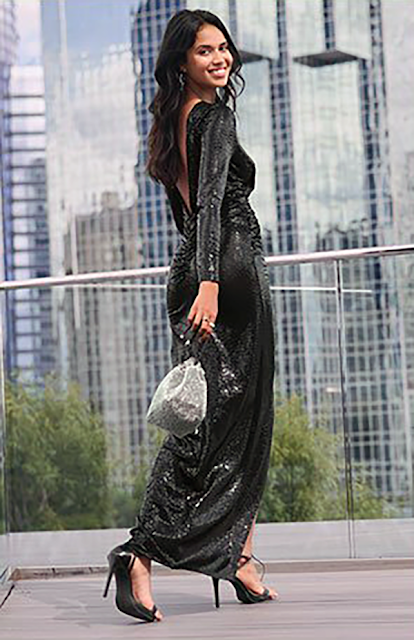By Paula Gaikowski
When I'm not at my desk here at Femulate Headquarters doing my nails, I enjoy reading about the Mafia and watching organized crime movies. Carmela Soprano, with her glamorous style, big hair, makeup and her nails, oh yes! While doing so I found a fascinating and unlikely connection between the machismo world of the Mafia and the feminine world of female impersonators.
In the 1950s and 1960s, at the height of the Mafia's influence, an unusual alliance formed between mobsters and the underground drag and gay club scene.
Stana has penned insightful articles detailing the vibrant nightlife of Club 82 in New York City. This drag club, known for its female impersonators, primarily catered to a cisgender audience. Surprisingly, it attracted Hollywood elite like Frank Sinatra, the Rat Pack and prominent politicians for both entertainment and possibly, illicit activities.
The venue was managed by Anna Genovese, wife of Vito Genovese, head of the Genovese crime family. In an era where homosexuality was denounced and essentially illegal, securing loans for such ventures was nearly impossible. Obtaining a liquor license posed another hurdle, not to mention the constant threat of police raids.
The Mafia stepped in to address these issues, providing loans, ensuring protection from police raids through their connections and turning these clubs into tax-free income sources. The back rooms of these establishments became hubs for illegal dealings, offering gangsters discreet meeting spaces where politicians or celebrities could meet with the underworld.
Moreover, the Mafia used these clubs for extortion and blackmail, leveraging compromising situations to manipulate patrons including influential figures. According to Columbo underboss Sonny Franzese, J. Edgar Hoover may have fallen victim to such tactics, possibly explaining his reluctance to prosecute the Mafia during his tenure as FBI director.
There was a positive aspect to all of this, a refuge where transgender individuals could authentically be themselves and find community.
In the unique world of Club 82 and similar establishments, the female impersonator acts of that time differed significantly from the theatrics of todays’ drag. These performers infused a refined, femininity into their acts, often mimicking famous female celebrities or developing their own female personas. Singing in their own female voices, dancing, and even incorporating comedy, these acts reflected a subtler form of expression.
Working in these clubs was demanding with performers often required to do three shows a night. Despite the grueling schedule, the band leaders and producers maintained high standards, expecting dedication and expertise from the performers. Many of these individuals, underpaid and overworked, lacked alternative options but found in these clubs a space to reach their potential and make a living within a supportive community that truly understood them
The Mafia played a role in providing protection from harassment. One transgender individual, working as a female impersonator, shared the profound sense of safety she felt while navigating the streets. Knowing that the Mafia would swiftly respond to any mistreatment, she felt a reassuring shield against potential harm. It was a unique blend of defiance and security that characterized this underground scene.
It’s important to note that the Stonewall, the site of the historic Stonewall riots, was also operated by the Mafia. Following the riots and the rise of the gay rights movement, the necessity for these underground clubs lessened. However, the partnership between the Mafia and these places persisted well into the 1980s. As transgender and gay individuals integrated into mainstream society, the power dynamic shifted and the Mafia’s involvement was less relevant. Today, shows like RuPaul's Drag Race have propelled drag and female impersonation into the mainstream as recognized art forms.
Understanding the covert and underground nature of being transgender or gay just a few decades ago is enlightening. The younger generations might not fully grasp the challenges faced and the hard-fought battles for LGBTQ+ rights. It serves as a reminder of the struggles endured in a culture of suppression.
(Click here if you are interested in learning more.)
 |
| Wearing Venus |
 |
| Paula Gaikowski channeling her inner Club 82, compliments of Jamie Austin |




That’s a lovely picture of you Paula!
ReplyDeleteIn 1999, I had a professional makeover and photoshoot with Jamie Austin and at that moment, the floodgates opened. --Paula G
DeleteI'd love to go back in time, slip into a sequined cocktail dress, stiletto heels and bouffant hair do and take in a show at Club 82! Of course, I would have a few Pink Squirrel cocktails too! Love the glamour of that era where every weekend night seemed like New Years Eve.
ReplyDeleteLauren
What an interesting story! Thanks for sharing it.
ReplyDeleteAnd Paula...wow! So stunning❤️
First off: Paula you were sensational (and you still cut a great figure)!
ReplyDeleteThose old clubs might have disappeared but at least we have one big advantage these days—the ability to go pretty much wherever we like. I have a sequinned gown I save for glitzy nights like the opera and special concerts but overall I love having the ability to wear my dresses and skirts to anything I might want to get up to during the day (and I enjoy being one of three people citywide in a skirt during the winter!)
If you love stories about the mafia, I highly recommend an Italian series: il Caciitori (the Hunter). It tells ls the story of Italy’s anti-mafia prosecutors and police. The first season is mostly a grisly recounting of killings & torture. The focus then shifts to the prosecutors and their point of view. That’s when it gets interesting.
ReplyDelete